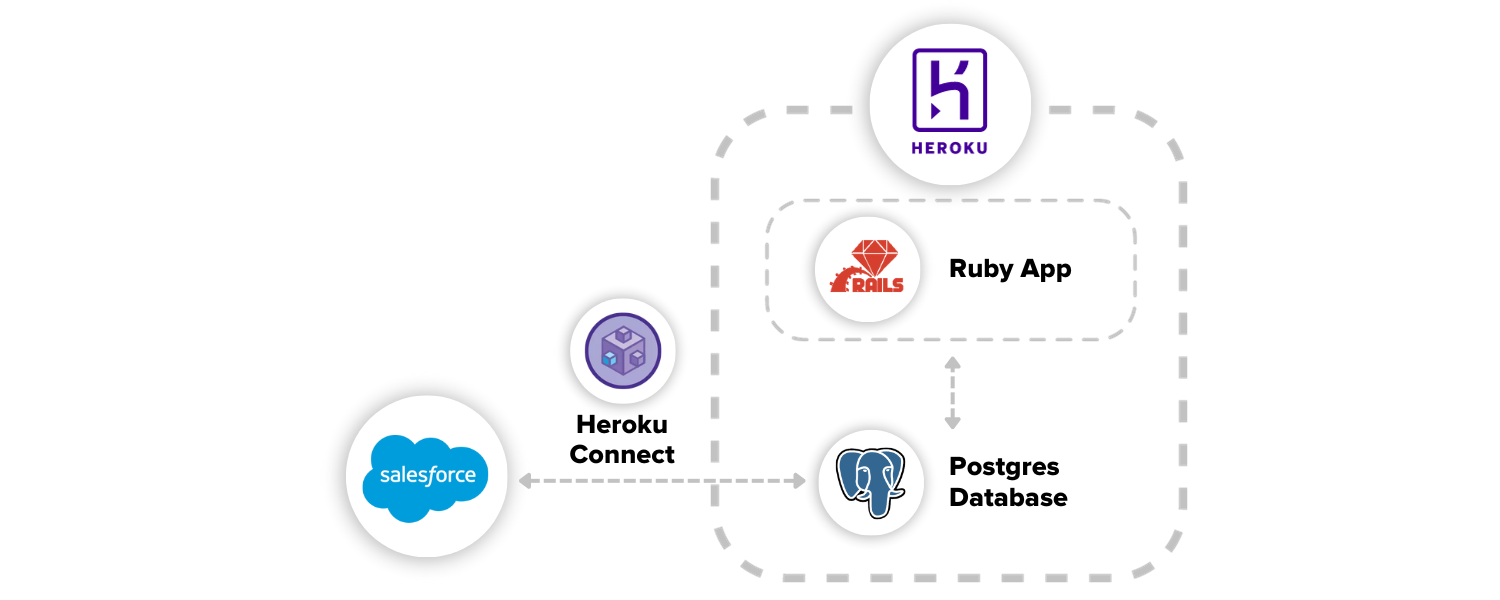A Practical Comparison of Heroku vs. AWS
Web app hosting is fundamental to ensuring that businesses operate efficiently, serve customers effectively, and protect sensitive data. Neglecting this aspect could lead to operational disruptions, security risks, and lost competitive advantage. By investing in the right hosting solutions, businesses can deliver superior performance, ensure security and compliance, and support future growth.
When it comes to hosting web applications, there are many great choices. Among the plethora of options, two major players often stand out: Heroku and AWS (Amazon Web Services). Both offer robust solutions for deploying and managing applications but each caters to different needs and preferences.
This article provides a detailed comparison of Heroku vs. AWS hosting, focusing on ease of use, integration capabilities, security, cost-effectiveness, and overall experience.
A closer look at Heroku & AWS: PaaS vs. IaaS
When comparing Heroku vs. AWS, it’s important to understand the distinction between Platform as a Service (PaaS) and Infrastructure as a Service (IaaS).
Heroku stands as a prime example of PaaS, focusing on offering a streamlined platform for developers to deploy, manage, and scale applications without getting bogged down in infrastructure management.
Conversely, AWS epitomizes IaaS, providing the foundational building blocks of computing resources like servers, storage, and networking, allowing users to have more control and customization over their infrastructure setup.
The key difference lies in the level of abstraction and responsibility each service model entails. PaaS abstracts away much of the underlying infrastructure concerns, empowering developers to focus on their applications’ development and functionality. On the other hand, IaaS grants users greater control over their infrastructure, requiring more hands-on management and expertise, particularly in the area of DevOps.
Heroku, leverages AWS behind the scenes, offering a seamless experience where the heavy lifting of infrastructure management is handled, making it an attractive option for teams prioritizing rapid development and deployment cycles without the overhead of managing infrastructure.
In contrast, AWS’s IaaS model caters to organizations seeking fine-grained control and customization over their infrastructure setup, necessitating a dedicated DevOps team to navigate and optimize the myriad configuration options available.
Heroku vs. AWS: Ease of Use
Heroku shines in its ease of use for app development. With its intuitive interface and streamlined deployment process, developers can get their Heroku app up and running quickly. Heroku removes much of the complexity associated with server management, allowing developers to focus solely on their code. The platform offers a seamless Git-based workflow, enabling effortless deployment with a simple Git push command. Heroku follows the principles of The Twelve-Factor App methodology, ensuring ideal practices in app development. Additionally, Heroku’s extensive documentation and user-friendly dashboard make it a breeze to monitor application performance and scale resources as needed.
AWS, on the other hand, boasts powerful infrastructure and a vast array of AWS services but requires a higher level of technical expertise to navigate effectively. Setting up and configuring servers on AWS can be daunting for beginners. These tasks can be time-consuming even for expert DevOps engineers. Managing infrastructure demands a deep understanding of networking and cloud computing concepts. While AWS offers flexibility and customization options, the learning curve can be steep, especially for teams without a lot of excess DevOps resources.
Heroku vs. AWS: Salesforce Integration
One of Heroku’s standout features is its seamless integration with Salesforce, the leading CRM platform. This integration opens up a world of possibilities for businesses looking to leverage the power of Salesforce alongside their web applications. With Heroku Connect, developers can effortlessly sync data bi-directionally between Heroku Postgres databases and Salesforce orgs, enabling real-time access to critical information.

While AWS doesn’t offer direct integration with Salesforce out of the box, developers can still achieve integration through custom implementations using AWS services such as Lambda functions and AWS API Gateway. However, this approach typically requires more development effort and maintenance compared to Heroku’s integrated solution. For organizations heavily invested in the Salesforce ecosystem, Heroku presents a compelling choice for hosting web applications.
Heroku vs. AWS: Security
Security is paramount in today’s digital landscape, and both Heroku and AWS prioritize the protection of customer data and applications. Heroku provides a secure-by-default environment with built-in features such as network isolation, data encryption, and regular security updates. The platform adheres to industry standards and compliance certifications, giving businesses peace of mind when it comes to safeguarding sensitive information.
For applications that need enhanced security, Heroku offers Heroku Private Spaces and Heroku Shield.
- Heroku Private Spaces provides a dedicated, isolated environment for enterprises to deploy their applications securely within their virtual network. This ensures enhanced privacy, compliance, and control over data, making it an ideal choice for businesses handling sensitive information.
- Heroku Shield offers additional layers of security and compliance features, including encryption, access controls, and audit trails, tailored specifically for industries with stringent regulatory requirements such as healthcare, finance, and government. Together, these offerings empower enterprises to leverage Heroku’s platform while maintaining the highest standards of security, compliance, and data protection.
AWS offers a robust set of security tools and features, including Identity and Access Management (IAM), Virtual Private Cloud (VPC), and AWS WAF (Web Application Firewall). However, configuring and managing these security measures requires careful attention to detail and ongoing monitoring. While AWS provides the building blocks for a highly secure environment, developers must implement best practices and stay vigilant against potential threats.
Regarding security, both Heroku and AWS offer reliable solutions, but Heroku’s simplicity and baked-in security features make it an attractive choice for businesses seeking a hassle-free hosting experience.
Heroku vs. AWS: Ecosystem of Extensions and Services
One of Heroku’s biggest advantages is its vibrant ecosystem of extensions and third-party services. From database add-ons like Heroku Postgres and Redis to application performance monitoring tools like New Relic, Heroku offers many options to enhance and extend the functionality of your applications. This rich ecosystem enables developers to leverage pre-built solutions for common challenges, reducing development time and complexity.
While AWS boasts an extensive marketplace of services and solutions, navigating through the myriad of options can be overwhelming for newcomers. Additionally, integrating third-party services with AWS often requires more manual configuration and setup compared to Heroku’s seamless add-ons. However, for organizations with specific requirements or unique use cases, AWS’s vast ecosystem provides unparalleled flexibility and scalability.
Heroku vs. AWS: Cost Considerations
When it comes to cost, AWS pricing offers a pay-as-you-go model with competitive rates, often making it the initial frontrunner. However, it’s essential to consider the total cost of ownership (TCO) over the long term, taking into account factors such as infrastructure management, scalability, and developer productivity.
While Heroku pricing may appear more expensive upfront, its simplicity and ease of use can translate into significant cost savings in terms of developer time and operational overhead. With Heroku, teams can focus on building and iterating on their applications without getting bogged down by infrastructure management tasks. On the other hand, AWS’s pricing structure can be more complex, requiring careful optimization to avoid unexpected costs.
Heroku’s predictable pricing and low maintenance overhead make it a compelling choice for most companies. However, for larger enterprises with complex requirements and dedicated DevOps teams, AWS can be a compelling option.
Experience the benefits of Heroku and AWS
For web application hosting, both Heroku and AWS offer robust solutions tailored to different needs and preferences. Heroku shines with its ease of use, seamless Salesforce integration, and rich ecosystem of extensions and services. The platform’s focus on developer productivity and simplicity makes it an ideal choice for startups and small to medium-sized businesses.
On the other hand, AWS boasts unparalleled scalability, flexibility, and customization options, making it well-suited for enterprises with complex infrastructure requirements and dedicated DevOps teams. While AWS may offer cost advantages initially, Heroku’s streamlined approach and lower maintenance overhead can lead to significant savings in the long run.
Ultimately, the choice between Heroku and AWS depends on factors such as project scope, technical expertise, budget, and integration requirements. By carefully evaluating these factors and weighing the pros and cons of each platform, businesses can make informed decisions that align with their goals and priorities in the ever-evolving landscape of web application hosting.
At LaunchPad Lab, our team of experts can help you select the best web hosting application based on your needs and ensure you get up and running fast. Schedule a consultation with one of our experts to get started today!



